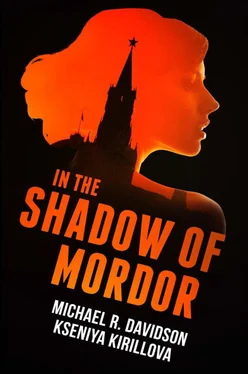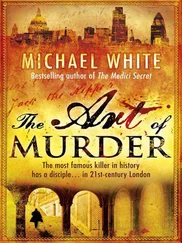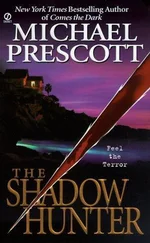“Well, I’m happy nothing happened to you,” he said in the kindest voice he could muster.
Olga nodded.
“It was not intended that you should be anywhere near when the operation came down. You never mentioned you lived so close to the metro Shtayn used. But the really good news is that we can confirm the kill, and that means you did your job well. Molodets! ” He unscrewed the cap on the vodka and poured liberal slugs into both glasses. He shoved one toward her. “Drink!”
Olga stared uncomprehendingly without picking up the small glass. “‘ …confirm the kill?’” Her voice trailed off.
Karpov peered at her through slitted eyes before answering. “Think about it this way: our target is just one of many casualties, which means his death will not be particularly suspicious, which means no suspicion will fall on us. That’s a good thing.”
He downed his vodka and poured another. The clear, viscous liquid spilled over the rim and puddled on the table. “Have a drink, and calm down.” He pointed to the glass he had filled for her before tipping his glassful down his throat.
Karpov’s words reached Olga through a swirling fog. She was tempted by the vodka, but she resisted as his words sank in.
“You’re telling me that the explosion was our doing? That it was done in order to assassinate Mark Shtayn?” She was nauseated and struggled not to vomit.
“Don’t give me that shit, Olga Vladimirovna. You know all about handling scum like that. This isn’t the first time you’ve fingered someone for elimination. Don’t tell me you’re beginning to think like an American with his head full of all that shit about tolerance and love?”
Olga was seized by terror of a sort she had never in her life experienced — a mindless, paralyzing, inexorable collision with the inevitable. This could not have anything to do with her . In her mind’s eye the scene at the Metro played out again, and the demons in the hellish inferno grinned at her complicity. No, I can’t have killed anyone .
Fear whispered in her ear, here is a murderer . An instinct of self-preservation from somewhere deep inside asserted itself, but the quiver in her voice betrayed her emotions. “I’m not sure I like this, Valeriy Eduardovich, “tracking down people so they can be, erm, eliminated.”
Karpov rendered a chuckle that was completely devoid of humor and shook his head in mock dismay. “There’s a popular Russian song, by Shevchuk, I think, where he’s drinking with an FSB general who says, ‘One must believe in something. If our leaders are deceiving us there is no reason to live.’ For guys like us, dorogaya , there is only one rule to live by, and that rule is duty. That’s what we have. That’s all we have. That’s what you have to believe in, just like Shevchuk’s general. It’s not complicated.”
“So we’re not supposed to ask any questions?”
“Never ask a question unless you already know the answer.”
“But I do have one question.”
Karpov raised his eyebrows.
“What did you mean when you said this wasn’t the first time I had ‘fingered’ someone for assassination?”
Karpov clicked his tongue against his teeth. “Don’t play the ingénue with me, Olga. I’ve read your file. You were given high marks for your denunciation of Sergey Illarionov.”
Bile rose to her throat, bitter and acidic, filling her mouth with its unpleasant taste. She’d denied her own suspicions so strongly that she’d almost forgotten them. Almost. But the seed was still there, buried and waiting.
She pondered Karpov’s philosophy and could not fault the logic. Yes, it was simple, maybe too simple. It was a quintessentially Russian point of view. All of her country’s actions were seen as part of a zero sum game. There are only two choices for a Russian: be Russian or be a traitor. There is no middle ground, so it’s impossible to be neutral.
The memory of that sun-lit day in the Kremlin dining room and Vlad’s burning eyes as he revealed his father’s plans — all of that swam before her eyes, as well as what she had done afterwards.
Karpov poured himself another shot and frowned into the glass. Maybe Polyanskaya was not cut out for FSB work, after all, no matter her pedigree. She was acting like a frightened child. But maybe it was just youth and the reality of an operational mission on foreign soil — something a bit more than simple denunciations at home.
He recalled his initial doubts about her.
“Duty is what we have as operatives,” he said.
“Anything goes?”
This was a question he did not like. He threw the drink back and slapped the glass onto the desk bottom up. A thought struck him. This could be a teaching moment. “Do you know what SMERSH was?”
“Everybody knows that. ‘Death to spies.’ It was a GRU operation during the Great Patriotic War.”
“Exactly. And it was very effective. But just because we won the war doesn’t mean we still don’t have enemies. And today, we have enemies within and enemies without.”
The immediacy of Karpov’s words struck Olga as strangely out of time. The Great Patriotic War, as Russians termed World War II, had ended 70 years ago, and the Cold War allegedly ended in 1989. Karpov made it seem like only yesterday that the Red Army had stormed the Reichstag.
Karpov continued without pause. “Depending on the level of danger or betrayal they represent, these enemies must be eliminated for the good of the Rodina , the Motherland.” Karpov did not have much use for nebulous, easily manipulated concepts such as patriotism, but it might appeal to the girl.
She nodded. “You mean people like Litvinenko.”
“That was a sloppy job. The two idiots entrusted with the mission left a radioactive evidence trail all over London and created a lot of problems for everyone. They should have swallowed their own polonium.” [11] Aleksandr Valterovich Litvinenko was a rogue FSB officer who went public with accusations of assassination committed by the FSB. He escaped to London where he was murdered through polonium poisoning.
Karpov smacked his fist into his palm. “That sukin syn , Litvinenko, was doing — had already done — enormous damage to us. He was a shitfaced traitor. Hell, yes, we took him out. We had every right, even a duty to do it. But it was not handled professionally. Now we use more delicate means to track down and eliminate traitors.”
The words slipped out before she could think, “And killing a hundred people to get to one is ‘delicate?’”
He scowled, his anger rising, “Sacrifices have to be made. The vodka was loosening his tongue, and he decided on a different tact to make his point, an incident farther in the past and therefore safer. “Ask your hero Solntsev sometime about 1999 and the bombings in in Buyansk, Moscow, and Volgodonsk.”
Karpov thought about opening another bottle, but discarded the idea. “But that operation was flawed, too. Three of our guys were caught planting explosives in Ryazan.” He paused to lean across the desk, so close that Olga felt his vodka-charged breath on her face. “That was unfortunate. But it won’t happen again, at least not on my watch.”
Olga leaned farther back in the chair to escape the verbal onslaught. Her stomach churned. She did not want to think too much about what Karpov was saying. Over two hundred Russian citizens had died and over six hundred were injured in the 1999 bombing of apartment buildings. Olga had been only a teenager at the time. Officially, the butchery was attributed to Chechen terrorists, but in Ryazan three FSB operatives were discovered planting explosives in another apartment building. This gave rise to the horrifying suspicion that the atrocities were intended all along to raise the popularity of a longshot candidate who was running for president. Indeed, that candidate, Vladimir Putin, won the election and initiated the second Chechen war. This was what Sergey Illarionov planned to expose. Did anyone really knew the truth, whether Illarionov was just spinning a yarn? But here was Karpov saying it was true. She just wanted the conversation to end.
Читать дальше












